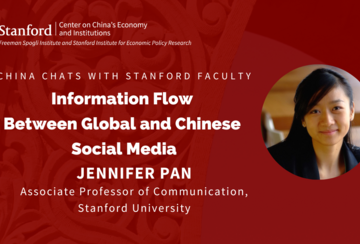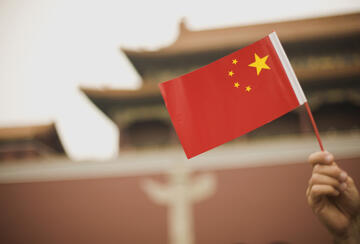
Stanford professor Jennifer Pan joined SCCEI for a conversation on her new research looking at information flow from the U.S. to China via social media during the COVID-19 pandemic.

CSIS Trustee Chair and SCCEI Collaborator Scott Kennedy and SCCEI Faculty Affiliate Yiqing Xu join the podcast Politics+Media 101 to discuss Russia-China relations and the possible implications the war in Ukraine will have on China-US relations.

"Big Data China" aims to bridge the gap between cutting-edge quantitative academic research and the Washington policy community. On February 11, 2022, SCCEI and CSIS hosted their first Big Data China event, "A Liberal Silent Majority in China?" Curated highlights from the first feature of the collaboration are included below.

China's Human Capital Problem: How are Industrialization and Automation Affecting Chinese Workers?
On the Sound of Economics Podcast Giuseppe Porcaro is joined by Alicia García-Herrero and Scott Rozelle to talk about the impact of industrialization and automation are having on rural and low-income workers in China.

The Little Red Podcast interviewed FSI senior fellow and SCCEI co-director Scott Rozelle on their podcast to discuss whether common prosperity in China can trickle down to the countryside or not and how China's rural population came to be where they are today.

"By 2016, China had the world’s largest stock of operational robots. This was a massive increase from 2010, when it trailed Japan, the United States, Germany, and South Korea. To learn why and how China is automating so rapidly, [Erin Slawson] spoke with Dr. Hongbin Li, Co-Director of the Stanford Center on China’s Economy and Institutions (SCCEI)."
Author Sam Olsen interviews Scott Rozelle about the findings in his book "Invisible China: How the Urban-Rural Divide Threatens China's Rise."

On December 11, 2021 The Economist published their list of the best books of 2021. Scott Rozelle's newest book, "Invisible China" was listed third on the line up!

Scott Rozelle introduces his recent publication, "Publishing and Assessing the Research of Economists: Lessons from Public Health" in a blog post for the China Economic Review's official Wechat account to celebrate its 30th anniversary.

Panel at Stanford China Economic Forum discusses climate change, financial technology as key areas of mutual interest.


The SCCEI China Briefs are short features that translate top-quality academic research into evidence-based insights for those interested in China and U.S.-China relations. Released twice a month, the briefs will cover timely issues that inform policy and advance the public understanding of China and its role on the global stage.

Authors Ryan Hass and Jude Blanchette highlight Scott Rozelle's research on the human capital criss in rural China.
SCCEI welcomed six postdoctoral scholars to the team this year. We spoke with each of them to learn more about them and their research interests.

The Summer of 2021: Consolidation of the New Chinese Economic Model with Professor Barry Naughton
During the summer of 2021, a “regulatory storm” shook markets in China. While the crackdown had its most immediate effects on private education, internet business, and finance, the government has also rolled out new policies to shape manufacturing and infrastructure, and even household fertility and income distribution.

China is Purging Celebrities and Tech Billionaires. But the Problem is Bigger than 'Sissy Men'
The Los Angeles Times writes about China's new "common prosperity" campaign to narrow the gap between rich and poor. However Scott Rozelle doesn't think "any of these policies that they’re doing are addressing the real underlying issues.” Rozelle says they need to invest in rural education so that workers can move into higher-skill jobs.

Author Anne Stevenson-Yang exposes the unseen rural China and states that "the best corrective to misunderstandings about this “invisible China” is a book that came out in 2020 and remains the most important book on China in a decade: Invisible China, by Scott Rozelle and Natalie Hell."

Washington Post: The Professor who Assigns Value to Nature — then Persuades World Leaders to Save It
SCCEI Affiliate Gretchen Daily is featured in The Washington Post discussing Natural Capital Project and her many research initiatives working to prioritize environmental conservation globally.

Scott Rozelle discusses the impact of COVID-19 control measures on employment and education in rural China during a presentation given to the EURICS/IFRAE/Universite de Liege webinar series.

Hongbin Li's research finds that "In China, the college entrance exam score is predictive for both firm success and wage-job success in the future, yet higher-score individuals are less likely to create firms."
"[Rozelle and Hell's] fresh book, Invisible China, focuses on an issue that has received little attention, China’s vast, isolated and long-neglected rural population. As the authors see it, the rural challenge has ‘remained invisible for too long, not only to the outside world but also to many Chinese’."

Xi Jinping himself has warned China’s wealth gap is not only economic but political and could threaten party’s legitimacy. Scott Rozelle is quoted sharing just how rare it is for someone in China to move from living in poverty in rural China to the ranks of the educated middle class. This article authored by Vincent Ni is also featured in Taipei Times.




